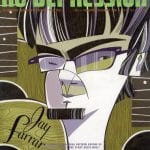Loudon Wainwright III – My image of myself is as a songwriter
ND: Most of the songs are very short. Is there anything behind that?
LW: I’m not sure why that’s more the case on this album. When a song feels done to me, I don’t worry whether it’s long or short.
ND: In a way the brevity of the songs works, because the theme of the album is so continuous. They’re more like movements in a longer piece.
LW: Yeah. The last couple of records, I’ve been thinking about trying to create some kind of mood. The idea being when someone sits down to listen to the CD, they’d sit down and listen from beginning to end. In sequencing, which is very important, you try to create an arc. The album feels short, though it’s 38 minutes, but we just wanted to create that tone.
ND: Yes, with CDs, the approach towards sequencing has changed; CDs are more like collections than albums.
LW: I’m an old-fashioned guy in a way. I still think I’m making records, not CDs.
II. THREE-MINUTE SONGS ABOUT A GRAVEYARD
ND: The main theme here is mortality, but it’s as much your own mortality as your mother’s.
LW: The death of my mother is one of the things that drives the record. But I’m of an age, 55, which means that’s what I’m thinking about. Slowing down, that process. It interests me, horrifies me. I’ve been writing about it for a while. Certainly on this record, with “Graveyard” and “Fresh Fossils”, they all go to that place. It’s something that’s going to happen and is happening to everyone. The danger is to become morbid and depressing and bum everyone out. And I’m not trying to work anything out in these songs. Maybe it makes me feel more in control or powerful to write a three-minute songs about a graveyard. (Laughs) That’s a human impulse. People that write things or paint things, one of the underlying impulses is to have control over things.
ND: The melodies and your voice, even if the lyrics are dark, the way you sing them gives a gaiety or youthful humor to them. Perhaps that’s one of the things that separates folk music from other forms.
LW: That’s an interesting observation. I use those folk melodies. I don’t claim to be an original tune writer. The melodies are borrowed and pasted together. They come out of those traditions of folk music and old-timey music, and some rock ‘n’ roll. They do have a sonic lift, especially if there’s fiddle and banjo.
ND: I was surprised that the album wasn’t more of a family affair.
LW: The only reason was that everyone was pretty busy. I thought about getting Rufus and Martha to sing on “Bed”. I don’t think it’s really all that important to have them there. They’ll be on the next record.
ND: Tell me about the musicians you did get.
LW: We got Suzzy Roche to sing. She’s my dearest friend, I guess, also the mother of my 20-year-old daughter Lucy. The fellow she lives with is the producer, Stewart Lerman. He’s worked with the Roches, and has done records with Dar Williams and Jules Shear. My friend Dick Connette did the arrangements. His contributions were substantial.
ND: How did you begin working with Stewart?
LW: Stewart produced this album Bleecker Street, with folk songs sung by more or less contemporary artists. I was the oldest contemporary artist. I think all the production serves the songs, never gets in the way, and invites you into the songs in a good way.
ND: How did you go about the arranging process with Dick?
LW: We would talk about what I had in mind. Dick has his own group, Last Forever. I’m a big fan of those records, that’s how met Dick. So he’ll go off and you leave him alone for a long time. He works very meticulously. Then he’ll come back and we’ll find what we need and do it.




